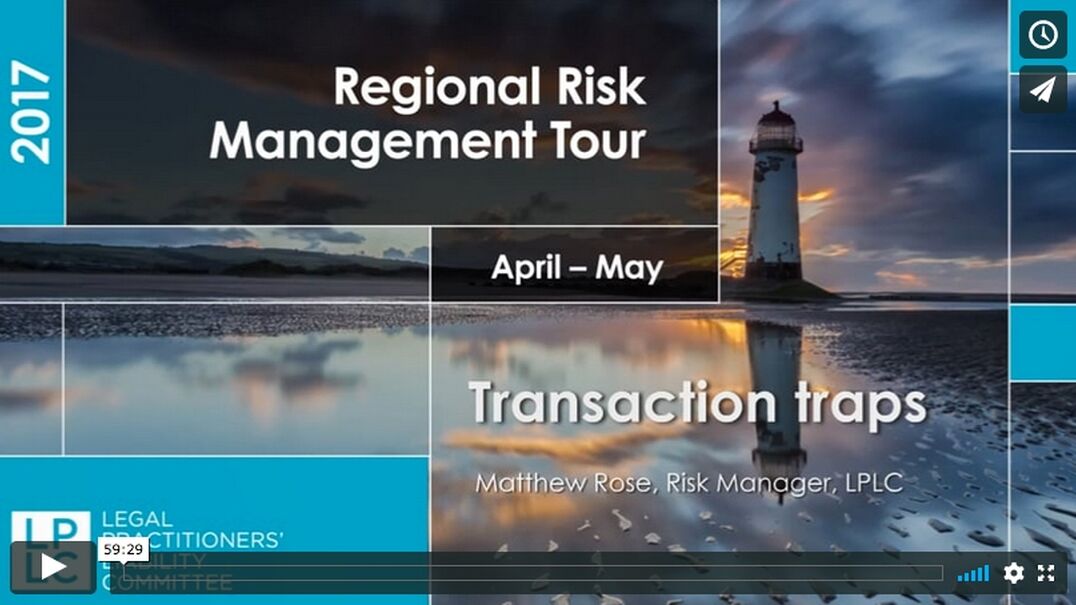Since LPLC published the first edition of Small business – big risk there have been some changes in the legal landscape which are particularly relevant to transactions for the sale of small businesses
Checklists
Small business – when acting for the purchaser
Sale and Purchase of Business, Professional Responsibility
07 May 24
This checklist covers the key issues you should consider when acting for the purchaser during the sale and purchase of a business.
Learn more
Checklists
Small business – when acting for the vendor
Sale and Purchase of Business, Professional Responsibility
07 May 24
This checklist covers the key issues you should consider when acting for the vendor during the sale and purchase of a business.
Learn more

Practice Risk Guides
Business sale and purchase — LPLC Practice Risk Guide
Personal Properties Securities, Sale and Purchase of Business, GST
01 May 24
The claims scenarios LPLC sees in relation to small business often arise from exuberant purchasers who have just signed up to buy their own business, full of hope and enthusiasm. They cannot wait to get into the business, want settlement in just a few days, and only need the practitioner to check the contract and make sure there are no major problems. The information in this LPLC Practice Risk Guide guide is designed to help practitioners recognise the trouble areas and manage clients in a way that best protects the client’s interests and their own position.
Learn more
Checklists
Subdivision limitations
Conveyancing, Leases, Building and Construction, Sale and Purchase of Business
05 Jun 23
Time limits most commonly missed in relation to subdivision.
Learn more
Checklists
Tax limitations
Conveyancing, Tax, GST, Leases, Personal Properties Securities, Sale and Purchase of Business, Building and Construction, Will Making, Powers of Attorney, Beneficiaries, Mortgages, Commercial
05 Jun 23
Time limits most commonly missed in relation to tax.
Learn more
Checklists
Bankruptcy limitations
Conveyancing, Tax, Leases, Personal Properties Securities, Sale and Purchase of Business, Building and Construction, Will Making, Beneficiaries, Mortgages, Personal Properties Securities, Solicitors Certificates, Personal Injury, Commercial
05 Jun 23
Time limits most commonly missed in relation to bankruptcy.
Learn more
Checklists
Statutory demand limitations
Leases, Building and Construction, Sale and Purchase of Business, Building and Construction, Commercial
05 Jun 23
Time limits most commonly missed in relation to statutory demand, a claim example and lessons learned.
Learn more
Checklists
Contribution limitations
Conveyancing, Tax, GST, Leases, Sale and Purchase of Business, Building and Construction, Mortgages, Personal Injury, Commercial
05 Jun 23
Time limits most commonly missed in relation to contributions.
Learn more
Checklists
Contracts limitations
Conveyancing, Tax, GST, Leases, Personal Properties Securities, Sale and Purchase of Business, Building and Construction, Mortgages, Personal Properties Securities, Commercial
05 Jun 23
Time limits most commonly missed in relation to contracts.
Learn more
Checklists
Appeals limitations
Conveyancing, Tax, GST, Leases, Building and Construction, Personal Properties Securities, Sale and Purchase of Business, GST, Building and Construction, Property settlements, Estate Administration, Mortgages, Personal Properties Securities, Personal Injury, Commercial
05 Jun 23
Time limits most commonly missed in relation to appeals, a claim example and lessons learned.
Learn more
Checklists
International contracts for the sale of goods limitations
Conveyancing, GST, Leases, Building and Construction, Personal Properties Securities, Sale and Purchase of Business, GST, Building and Construction, Personal Properties Securities
05 Jun 23
Time limits most commonly missed in relation to international contracts for the sale of goods.
Learn more
Checklists
Transport accident limitations
Sale and Purchase of Business, Commercial
05 Jun 23
Time limits most commonly missed in relation to transport acccidents.
Learn more
Checklists
Instruments limitations
Conveyancing, Tax, GST, Leases, Personal Properties Securities, Sale and Purchase of Business, Building and Construction, Mortgages, Personal Properties Securities, Commercial
05 Jun 23
Time limits most commonly missed in relation to instruments, a claim example and lesson learned.
Learn more
Checklists
Trade mark limitations
Sale and Purchase of Business, Commercial
05 Jun 23
Time limits most commonly missed in relation to trade marks.
Learn more
Checklists
Liquidator limitations
Conveyancing, Tax, GST, Leases, Building and Construction, Personal Properties Securities, Sale and Purchase of Business, Building and Construction, Personal Properties Securities
05 Jun 23
Time limits most commonly missed in relation to liquidation, a claim example and lessons learned.
Learn more
Checklists
Caveats limitations
Conveyancing, Tax, GST, Leases, Sale and Purchase of Business
05 Jun 23
Time limits most commonly missed in relation to caveats, a claim example and lessons learned.
Learn more
Checklists
Property websites and comments
Conveyancing, Building and Construction, Sale and Purchase of Business
09 Sep 14
This checklist is a list of links to web resources relating to property that will help you conduct research. LPLC has provided commentary under each resource to explain best how to use it.
Learn more
LPLC Articles
Commercial and Industrial Property tax questions and answers
Conveyancing, Tax, Sale and Purchase of Business
03 Jul 24
Changes to stamp duty and the introduction of an annual property tax on commercial and industrial land under the Commercial and Industrial Property Tax Reform Act commenced 1 July 2024. Practitioners acting in matters involving commercial or industrial land in Victoria need to be aware of the full extent of these significant reforms.
LPLC has provided comprehensive information about the reforms in the article Commercial and Industrial Property Tax reform in Victoria — What you need to know, and a webinar Commercial and Industrial Property Tax (CIPT): Navigating the new reform.
Here we provide some additional answers to specific questions we have received from practitioners. We recommend practitioners use this information to gain a full understanding of the reforms and their practical application.
Learn more
LPLC Articles
Commercial and Industrial Property Tax reform in Victoria — What you need to know
Conveyancing, Tax, Sale and Purchase of Business
03 Jul 24
The Commercial and Industrial Property Tax Reform Bill (the Bill) was introduced into the Victorian Parliament on 20 March 2024. The reforms are expected to pass into law in early May before commencing on 1 July 2024 (Note: the Act was passed in the same terms as the Bill).
Learn more
LPLC Articles
Unfair Contract Terms Regime Changes: Are you ready to advise clients?
Conveyancing, Building and Construction, Sale and Purchase of Business, Building and Construction
17 Nov 23
Significant changes to the unfair contract terms (UCT) regime in the Australian Consumer Law commenced on 9 November 2023. Almost all Australian businesses are affected by the UCT regime and should review their standard form consumer contracts and small business contracts to ensure they do not include any 'unfair contract terms'. Legal practitioners providing contractual advice are expected to be aware of and understand the changes to advise their clients. Failing to do so may result in severe consequences for clients (including substantial penalties) and expose practitioners to professional negligence claims.
Learn more
Checklists
Small business – when acting for the purchaser
Sale and Purchase of Business, Professional Responsibility
07 May 24
This checklist covers the key issues you should consider when acting for the purchaser during the sale and purchase of a business.
Learn more
Checklists
Small business – when acting for the vendor
Sale and Purchase of Business, Professional Responsibility
07 May 24
This checklist covers the key issues you should consider when acting for the vendor during the sale and purchase of a business.
Learn more
Checklists
Subdivision limitations
Conveyancing, Leases, Building and Construction, Sale and Purchase of Business
05 Jun 23
Time limits most commonly missed in relation to subdivision.
Learn more
Checklists
Tax limitations
Conveyancing, Tax, GST, Leases, Personal Properties Securities, Sale and Purchase of Business, Building and Construction, Will Making, Powers of Attorney, Beneficiaries, Mortgages, Commercial
05 Jun 23
Time limits most commonly missed in relation to tax.
Learn more
Checklists
Bankruptcy limitations
Conveyancing, Tax, Leases, Personal Properties Securities, Sale and Purchase of Business, Building and Construction, Will Making, Beneficiaries, Mortgages, Personal Properties Securities, Solicitors Certificates, Personal Injury, Commercial
05 Jun 23
Time limits most commonly missed in relation to bankruptcy.
Learn more
Checklists
Statutory demand limitations
Leases, Building and Construction, Sale and Purchase of Business, Building and Construction, Commercial
05 Jun 23
Time limits most commonly missed in relation to statutory demand, a claim example and lessons learned.
Learn more
Checklists
Contribution limitations
Conveyancing, Tax, GST, Leases, Sale and Purchase of Business, Building and Construction, Mortgages, Personal Injury, Commercial
05 Jun 23
Time limits most commonly missed in relation to contributions.
Learn more
Checklists
Contracts limitations
Conveyancing, Tax, GST, Leases, Personal Properties Securities, Sale and Purchase of Business, Building and Construction, Mortgages, Personal Properties Securities, Commercial
05 Jun 23
Time limits most commonly missed in relation to contracts.
Learn more
Checklists
Appeals limitations
Conveyancing, Tax, GST, Leases, Building and Construction, Personal Properties Securities, Sale and Purchase of Business, GST, Building and Construction, Property settlements, Estate Administration, Mortgages, Personal Properties Securities, Personal Injury, Commercial
05 Jun 23
Time limits most commonly missed in relation to appeals, a claim example and lessons learned.
Learn more
Checklists
International contracts for the sale of goods limitations
Conveyancing, GST, Leases, Building and Construction, Personal Properties Securities, Sale and Purchase of Business, GST, Building and Construction, Personal Properties Securities
05 Jun 23
Time limits most commonly missed in relation to international contracts for the sale of goods.
Learn more
Checklists
Transport accident limitations
Sale and Purchase of Business, Commercial
05 Jun 23
Time limits most commonly missed in relation to transport acccidents.
Learn more
Checklists
Instruments limitations
Conveyancing, Tax, GST, Leases, Personal Properties Securities, Sale and Purchase of Business, Building and Construction, Mortgages, Personal Properties Securities, Commercial
05 Jun 23
Time limits most commonly missed in relation to instruments, a claim example and lesson learned.
Learn more
Checklists
Trade mark limitations
Sale and Purchase of Business, Commercial
05 Jun 23
Time limits most commonly missed in relation to trade marks.
Learn more
Checklists
Liquidator limitations
Conveyancing, Tax, GST, Leases, Building and Construction, Personal Properties Securities, Sale and Purchase of Business, Building and Construction, Personal Properties Securities
05 Jun 23
Time limits most commonly missed in relation to liquidation, a claim example and lessons learned.
Learn more
Checklists
Caveats limitations
Conveyancing, Tax, GST, Leases, Sale and Purchase of Business
05 Jun 23
Time limits most commonly missed in relation to caveats, a claim example and lessons learned.
Learn more
Checklists
Property websites and comments
Conveyancing, Building and Construction, Sale and Purchase of Business
09 Sep 14
This checklist is a list of links to web resources relating to property that will help you conduct research. LPLC has provided commentary under each resource to explain best how to use it.
Learn more

Webinars
Commercial and Industrial Property Tax (CIPT): Navigating the new reform
Conveyancing, Tax, Sale and Purchase of Business
23 May 24
This webinar covers the latest changes in property tax law, and helps to navigate the transition from stamp duty to an annual property tax for commercial and industrial properties in Victoria.
Learn more

Videos
Buying or selling a small business
Sale and Purchase of Business
28 Aug 18
This video looks at three things to do to help minimise your risk of a claim when acting in the sale or purchase of a small business.
Learn more

Videos
Transaction Traps
Sale and Purchase of Business
17 Oct 17
In this seminar from our 2017 Risk Management Regional Tour, LPLC Risk Manager, Matthew Rose, looks at regional claims for sale and purchase of small business and advises practitioners how to avoid claims risks.
Learn more
Subscribe to LPLC News & Alerts
Subscribe to receive the latest Risk Management resources, updates and news directly to your inbox.